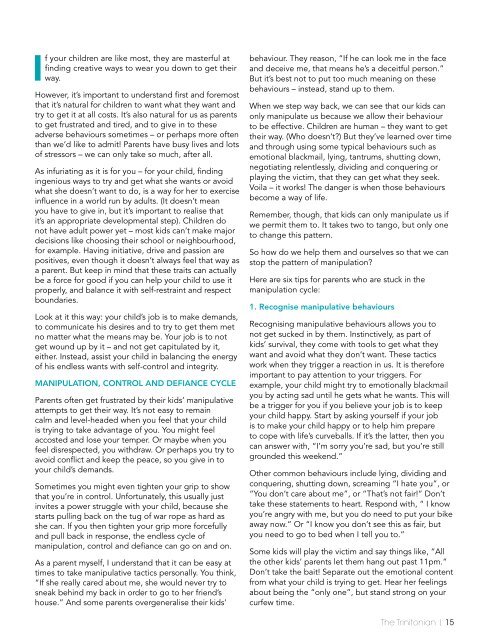TRINITONIAN 14 July 2019
You also want an ePaper? Increase the reach of your titles
YUMPU automatically turns print PDFs into web optimized ePapers that Google loves.
If your children are like most, they are masterful at<br />
finding creative ways to wear you down to get their<br />
way.<br />
However, it’s important to understand first and foremost<br />
that it’s natural for children to want what they want and<br />
try to get it at all costs. It’s also natural for us as parents<br />
to get frustrated and tired, and to give in to these<br />
adverse behaviours sometimes – or perhaps more often<br />
than we’d like to admit! Parents have busy lives and lots<br />
of stressors – we can only take so much, after all.<br />
As infuriating as it is for you – for your child, finding<br />
ingenious ways to try and get what she wants or avoid<br />
what she doesn’t want to do, is a way for her to exercise<br />
influence in a world run by adults. (It doesn’t mean<br />
you have to give in, but it’s important to realise that<br />
it’s an appropriate developmental step). Children do<br />
not have adult power yet – most kids can’t make major<br />
decisions like choosing their school or neighbourhood,<br />
for example. Having initiative, drive and passion are<br />
positives, even though it doesn’t always feel that way as<br />
a parent. But keep in mind that these traits can actually<br />
be a force for good if you can help your child to use it<br />
properly, and balance it with self-restraint and respect<br />
boundaries.<br />
Look at it this way: your child’s job is to make demands,<br />
to communicate his desires and to try to get them met<br />
no matter what the means may be. Your job is to not<br />
get wound up by it – and not get capitulated by it,<br />
either. Instead, assist your child in balancing the energy<br />
of his endless wants with self-control and integrity.<br />
MANIPULATION, CONTROL AND DEFIANCE CYCLE<br />
Parents often get frustrated by their kids’ manipulative<br />
attempts to get their way. It’s not easy to remain<br />
calm and level-headed when you feel that your child<br />
is trying to take advantage of you. You might feel<br />
accosted and lose your temper. Or maybe when you<br />
feel disrespected, you withdraw. Or perhaps you try to<br />
avoid conflict and keep the peace, so you give in to<br />
your child’s demands.<br />
Sometimes you might even tighten your grip to show<br />
that you’re in control. Unfortunately, this usually just<br />
invites a power struggle with your child, because she<br />
starts pulling back on the tug of war rope as hard as<br />
she can. If you then tighten your grip more forcefully<br />
and pull back in response, the endless cycle of<br />
manipulation, control and defiance can go on and on.<br />
As a parent myself, I understand that it can be easy at<br />
times to take manipulative tactics personally. You think,<br />
“If she really cared about me, she would never try to<br />
sneak behind my back in order to go to her friend’s<br />
house.” And some parents overgeneralise their kids’<br />
behaviour. They reason, “If he can look me in the face<br />
and deceive me, that means he’s a deceitful person.”<br />
But it’s best not to put too much meaning on these<br />
behaviours – instead, stand up to them.<br />
When we step way back, we can see that our kids can<br />
only manipulate us because we allow their behaviour<br />
to be effective. Children are human – they want to get<br />
their way. (Who doesn’t?) But they’ve learned over time<br />
and through using some typical behaviours such as<br />
emotional blackmail, lying, tantrums, shutting down,<br />
negotiating relentlessly, dividing and conquering or<br />
playing the victim, that they can get what they seek.<br />
Voila – it works! The danger is when those behaviours<br />
become a way of life.<br />
Remember, though, that kids can only manipulate us if<br />
we permit them to. It takes two to tango, but only one<br />
to change this pattern.<br />
So how do we help them and ourselves so that we can<br />
stop the pattern of manipulation?<br />
Here are six tips for parents who are stuck in the<br />
manipulation cycle:<br />
1. Recognise manipulative behaviours<br />
Recognising manipulative behaviours allows you to<br />
not get sucked in by them. Instinctively, as part of<br />
kids’ survival, they come with tools to get what they<br />
want and avoid what they don’t want. These tactics<br />
work when they trigger a reaction in us. It is therefore<br />
important to pay attention to your triggers. For<br />
example, your child might try to emotionally blackmail<br />
you by acting sad until he gets what he wants. This will<br />
be a trigger for you if you believe your job is to keep<br />
your child happy. Start by asking yourself if your job<br />
is to make your child happy or to help him prepare<br />
to cope with life’s curveballs. If it’s the latter, then you<br />
can answer with, “I’m sorry you’re sad, but you’re still<br />
grounded this weekend.”<br />
Other common behaviours include lying, dividing and<br />
conquering, shutting down, screaming “I hate you”, or<br />
“You don’t care about me”, or “That’s not fair!” Don’t<br />
take these statements to heart. Respond with, “ I know<br />
you’re angry with me, but you do need to put your bike<br />
away now.” Or “I know you don’t see this as fair, but<br />
you need to go to bed when I tell you to.”<br />
Some kids will play the victim and say things like, “All<br />
the other kids’ parents let them hang out past 11pm.”<br />
Don’t take the bait! Separate out the emotional content<br />
from what your child is trying to get. Hear her feelings<br />
about being the “only one”, but stand strong on your<br />
curfew time.<br />
The Trinitonian | 15

















